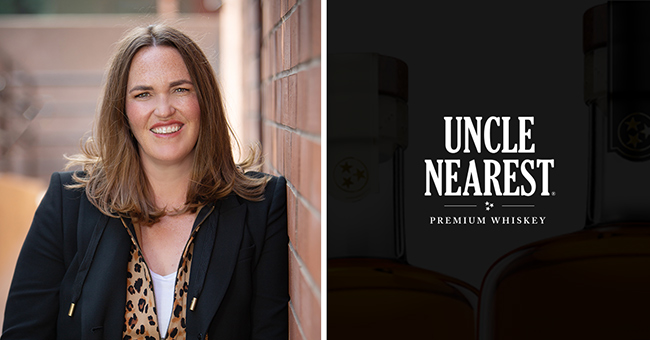
Last December, Uncle Nearest Premium Whiskey announced that its sales exceeded $100 million through October 2022, with an on-track forecast to more than double that total by the end of 2023. The company was founded by its CEO Fawn Weaver in 2017, whose $50 million Uncle Nearest Venture Fund has invested in minority-owned brands like Hella Cocktail Co and Sorel.
Katharine (Kate) Jerkens has been part of the team since the beginning, joining Uncle Nearest prior to its launch in 2017 when Weaver approached her about the idea of starting the whiskey brand. With over 20 years of experience in the hospitality industry, the CBO helped the company reach nationwide distribution in less than two years after the initial launch and has stewarded it to become the fastest-growing American whiskey brand in history, according to the company.
In addition to her role as CBO, Jerkens is also a leader of the Nearest & Jack Advancement Initiative, an incubator for diversifying the current and future leaders in the whiskey industry. Launched in 2020, Uncle Nearest teamed up with Jack Daniel’s Tennessee Whiskey to make a combined $5 million pledge towards providing access to the education and resources needed to be successful in a predominantly white-owned and led spirits industry. The initiative will host its first Spirits on the Rise Summit on April 17 and 18, bringing together spirits industry entrepreneurs from historically underrepresented communities.
We spoke to Jerkens about what to expect from the upcoming summit, how the team is advancing diversity in the whiskey industry, and where Uncle Nearest is headed next. Answers have been edited for clarity and length.
The Nearest & Jack Advancement Initiative recently announced the first ‘Spirits on the Rise’ Summit. What do you hope this event achieves?
Our goal with this event is to give Black, Indigenous and People of Color (BIPOC) spirits entrepreneurs access to other entrepreneurs, access to distributors and national accounts, access to investors and financiers, and ultimately to provide tools to add to their bag to lead them to success in this industry.
What are some of the biggest challenges to advance diversity within the American whiskey industry?
Speed. That is why we developed the apprenticeship program. People of color don’t have many role models (yet) in this industry that are in visible leadership positions. Without seeing those that look like you, it’s hard to aspire to grow in this business. With the apprenticeship program, our goal is for each “graduate” to come out in a visible leadership position so that people see them and want to follow their path, or forge their own, in this industry.
The Nearest & Jack Advancement Initiative has made some big strides in the past three years. What are you most proud of?
All of it. This was an amazing coming together of two distilleries with a common mission. We really paved the way in 2020, and I couldn’t be more proud of both teams working on this collective mission. Ultimately, it’s been about the end game, and seeing how far Byron,
Tracie, and Chris have come, and watching them pave the way for others in the industry, it’s incredible.
Byron Copeland and Tracie Franklin are graduates from the initiative’s Leadership Acceleration Program, a comprehensive whiskey industry apprenticeship program. Copeland was named manager of leadership acceleration and maturation innovation at the Jack Daniel Distillery following graduation. Franklin is the founder of Spirited Tracie, under which she offers her services as a whiskey educator, public speaker, and consultant. Chris Montana is the founder of Minneapolis-based Du Nord Social Spirits, a small batch distillery producing gin, vodka, liqueurs, and the first graduate of the Business Incubation Program, one of the core pillars of the initiative. Upon graduating last year, the distillery was available in 10 states and partnered with Delta Air Lines to have its Foundation Vodka available on all domestic Delta flights.
At the summit you’ll be offering a presentation called “Route to Market: Building your Brand’s Distribution.” What are some of the key lessons you’ll share with brands who are building out those channels?
This will be a panel representing all tiers of this business for BIPOC entrepreneurs to see the various paths one must take to get distribution. We’ll be looking at what distributors are looking at when choosing brands, discussing how much money, time, and effort it will take to get a distributor to be working alongside you, looking at what key national accounts, bars, restaurants, stores are looking at when bringing on a new brand, and lastly, looking at e-commerce and what an incredible route to market that can be for new brands.
What is your economic outlook for 2023 in regards to spirits, and how is that influencing strategies the summit will be sharing with new and emerging BIPOC spirit brands?
The customer is looking for a diverse range of spirits, and wanting to see and support more BIPOC brands, so the runway for all of these entrepreneurs is long. In addition, direct-to-consumer continues to be a trend that hasn’t slowed down, so looking at that as an avenue to be able to reach more customers will be discussed at the summit, as well.
In 2022, Uncle Nearest announced it had become the best-selling Black American-founded, owned, and led spirit brand in U.S. history. Last year, it crossed the $100 million sales mark. What are your business goals for this year and how do you plan to get there?
We are locked and loaded on one thing: cementing the legacy of Nearest Green. We will reach one million cases sold by the end of this year, and in early 2024, we will continue to expand our reach outside of the United States. Not to mention, Nearest Green Distillery expects to triple the over 100,000 visitors it had in the last 12 months by the end of this year.